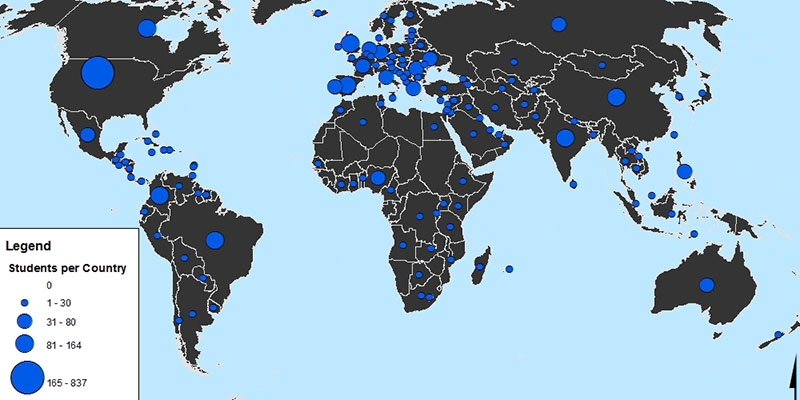‘Geodesign: change your world’
Downloads
DOI:
https://doi.org/10.7480/rius.4.1368Abstract
A MOOC titled “Geodesign: Change your world” demonstrated a unique approach to scaling up awareness about geodesign to a global audience. Massive Open Online Courses (MOOCs) are gaining visibility as a wide-reaching educational trend to provide exposure on topics, theories and techniques in any field. The first MOOC on the subject of geodesign was offered in Autumn 2014. Over 17,000 people registered from 167 countries. The results yielded a unique worldwide conversation about geodesign. This paper discusses how this MOOC engaged a global audience of thousands, including the challenges and opportunities experienced with the development and delivery of the MOOC. The outcomes illustrate how participants gained appreciation for the role geodesign can play in land planning and design issues in their location. The Geodesign MOOC course’s dynamic structure breaks from the typical format of MOOCs. Examined here are the innovative course design and delivery mechanisms deployed in this MOOC. Drawing on recent research about online learning, pedagogical and technological issues important to consider in MOOC development are reviewed.
How to Cite
Published
Issue
Section
License
Copyright (c) 2016 Kelleann Foster

This work is licensed under a Creative Commons Attribution 4.0 International License.
References
Artz, M. (2010). Jack Dangermond Talks About GeoDesign at TED 2010. GIS and Science, February 11. Retrieved from http://gisandscience.com/2010/02/11/jack-dangermond-talks-about-geodesign-at-ted-2010/
Arup Foresight (n.d.). Drivers of Change. http://www.driversofchange.com/tools/doc/
ASLA (American Society of Landscape Architects) (n.d.). Professional Awards. http://www.asla.org/individualaward.aspx?id=4244
Bali, M. (2014). MOOC pedagogy: gleaning good practice from existing MOOCs. MERLOT. Journal of Online Learning and Teaching, 10(1), 44-56. Retrieved from http://jolt.merlot.org/vol10no1/bali_0314.pdf
COIL (2015). MOOC Research Cluster meeting discussion; author’s notes. February 18. http://coil.psu.edu/blog/mooc-research-cluster-experience/
De Waard, I., Koutropoulos, A., Keskin, N., Abajian, S. C., Hogue, R., Rodriguez, O., & Gallagher, M. S. (2011). Exploring the MOOC format as a pedagogical approach for mLearning. Proceedings from mLearn. Retrieved from http://mlearn.bnu.edu.cn/source/ten_outstanding_papers/Exploring%20the%20MOOC%20format%20as%20a%20pedagogical%20approach%20for%20mLearning.pdf
Flaxman, M. (2010). GeoDesign: Fundamental Principles. Paper presented at the Geodesign Summit, Redlands, CA. Retrieved from http://video.esri.com/watch/106/%20geodesign-fundamental-principles.
Foster, K. (2015). Geodesign Parsed: Placing it within the rubric of recognized design theories. Landscape and Urban Planning (in second review).
Geodesign summits. The author attended the summits: Geodesign Summit, Redlands, CA, 2012-2015; Geodesign Summit- Europe, 2013, 2014; Geodesign Summit- China, 2013. There were also Geodesign Summits, Redlands, CA, 2010, 2011.
Head, K. (2013). Inside a MOOC in progress. The Chronicle of Higher Education. Retrieved from http://chronicle.com/blogs/wiredcampus/inside-a-mooc-in-progress/44397
Jordon, K. (n.d.). MOOC Completion Rates: The Data. Retrieved from http://www.katyjordan.com/MOOCproject.html
Kizilcec, R. F., Piech, C., & Schneider, E. (2013, April). Deconstructing disengagement: analysing learner subpopulations in massive open online courses. Proceedings of the third international conference on learning analytics and knowledge (pp. 170-179). ACM.
Koller, D. (2012). Daphne Koller: What we are learning from online education. TED Talk. [Video File] Retrieved from, http://www.ted.com/talks/daphne_koller_what_we_re_learning_from_online_education#t-708734
Lang, J. (2014). Educating Minds Online – An outstanding new book provides a road map for truly effective teaching with technology. The Chronicle of Higher Education. Retrieved from http://chronicle.com/paper/Educating-Minds-Online/150743/?cid=wc
Luo, H., Robinson, A., & Park, J. (2014). Peer Grading in a MOOC: Reliability, Validity, and Perceived Effects. Online Learning: Official Journal Of The Online Learning Consortium, 18(2). Retrieved from, http://olj.onlinelearningconsortium.org/index.php/jaln/paper/view/429
McElvaney, S. (2013). Geodesign – Strategies for Urban Planning. Paper presented at American Planning Association (APA) National Conference, Chicago, IL, April.
McElvaney, L. A., & Foster, K. (2014). Enhancing Stakeholder Engagement: Understanding Organizational Change Principles for Geodesign Professionals. In Geodesign by Integrating Design and Geospatial Sciences (pp. 315-329). Springer International Publishing.
Miller, M. D. (2014). Minds online: Teaching effectively with technology. Cambridge, Massachusetts: Harvard University Press.
Miller, W.R. (2012). Introducing Geodesign: The Concept. Redlands, CA: Esri Press.
Norvig, P. (2012). The 100,000-student Classroom. TED Talk, February. [Video File]. Retrieved from http://on.ted.com/Norvig
Perna, L. W., Ruby, A., Boruch, R. F., Wang, N., Scull, J., Ahmad, S., & Evans, C. (2014). Moving through MOOCs: Understanding the progression of users in massive open online courses. Educational Researcher, 43(9), 421-432. doi:10.3102/0013189X14562423
Robinson, A. C. (2013). Bridging Distance in Cartographic Education. Sharing knowledge, 12. Retrieved from http://lazarus.elte.hu/ccc/2013icc/skproceedings.pdf#page=17
Robinson, A. C., Kerski, J., Long, E. C., Luo, H., DiBiase, D., & Lee, A. (2015). Maps and the geospatial revolution: teaching a massive open online course (MOOC) in geography. Journal of Geography in Higher Education, (ahead-of-print), 1-18.
Smith, K. L., McDonald, S. J. (2013). How will MOOCs Affect Fair Use and Copyright Compliance? Academic Impressions, January 11. Retrieved from http://www.academicimpressions.com/news/how-will-moocs-affect-fair-use-and-copyright-compliance
Steinitz, C. (2012). A Framework for Geodesign – Changing Geography by Design. Redlands, CA: Esri Press.
Stenger, M. (2014). The Shiny New Tech Syndrome and What To Focus On Instead: An Interview with Kevin Guidry. InformED. Retrieved from http://www.opencolleges.edu.au/informed/features/where-higher-education-and-technology-intersect-an-interview-with-kevin-guidry/#ixzz3LAIiftHa
Straumsheim, C. (2014). All Things in Modulation. Inside Higher Ed. Retrieved from
Yousef, A. M. F., Chatti, M. A., Schroeder, U., & Wosnitza, M. (2014, July). What Drives a Successful MOOC? An Empirical Examination of Criteria to Assure Design Quality of MOOCs. In Advanced Learning Technologies (ICALT), 2014 IEEE 14th International Conference On (pp. 44-48). IEEE.
Wilson, M. W. (2014). On the criticality of mapping practices: Geodesign as critical GIS? Landscape and Urban Planning. http://dx.doi.org/10.1016/j.landurbplan.2013.12.017




